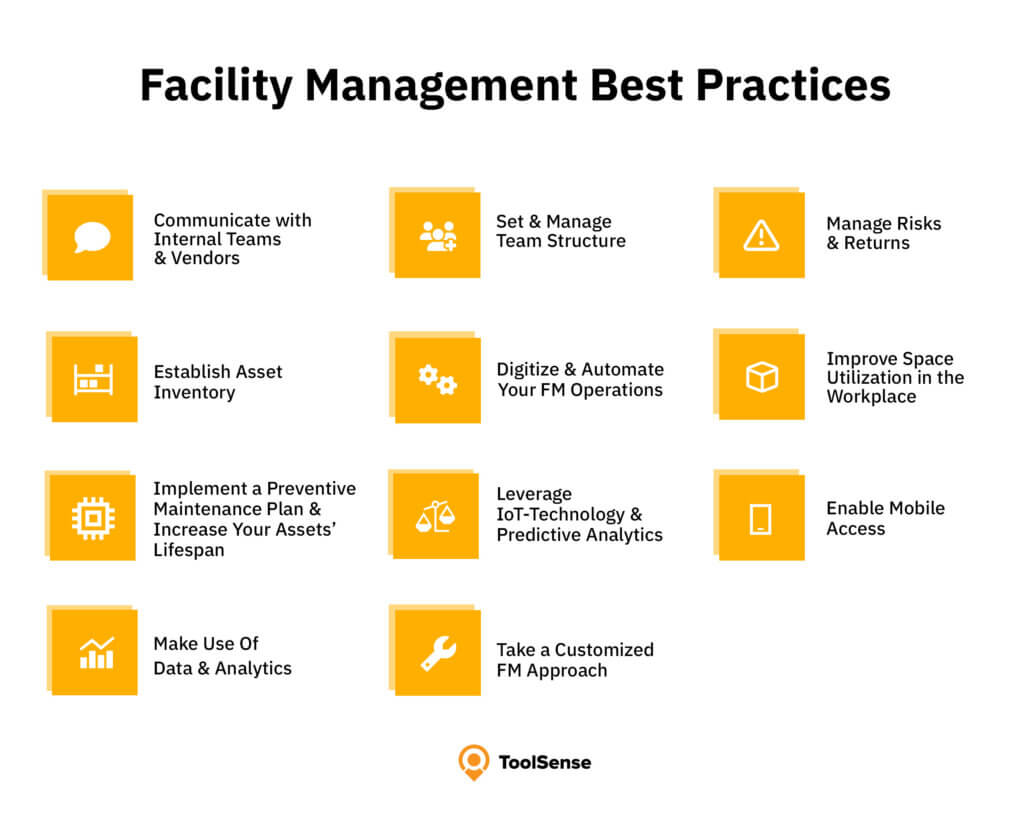Why Total Facility Management Is Essential for Organization Success
Total Facility Management (TFM) functions as a keystone for business success by balancing varied operational facets such as upkeep, space application, and precaution. This assimilation not only boosts effectiveness however likewise aligns facility management with overarching organizational goals. As companies browse a competitive landscape, understanding the multifaceted advantages of TFM can be pivotal in driving price efficiency and boosting staff member performance. The implications of taking on TFM extend much past prompt functional gains, elevating crucial concerns regarding its long-term influence on organizational resilience and competition. What exists beneath this important structure?
Recognizing Total Facility Management
Total Facility Management (TFM) includes a thorough method to taking care of an organization's buildings and connected solutions to make sure optimum functionality, safety and security, and performance. TFM incorporates various self-controls, including maintenance, procedures, room management, and safety protocols, to develop a cohesive framework that supports an organization's core goals.
At its core, TFM intends to streamline the processes involved in facility management, boosting and reducing redundancies service shipment. This technique involves the sychronisation of activities associated with building management, such as repair services, cleansing, and power management, to cultivate an effective environment for stakeholders and workers alike. TFM also emphasizes the importance of carrying out best practices and innovative modern technologies to boost service quality and minimize functional costs.
Understanding TFM requires acknowledgment of its critical significance in sustaining a company's goal. By straightening facility management tasks with organizational goals, TFM improves total performance while ensuring compliance with health and wellness, security, and ecological guidelines. Therefore, TFM serves not just as a logistical function yet also as a tactical asset, adding to a company's lasting sustainability and growth. In summary, TFM is vital for creating a well-functioning atmosphere for organization success.
Key Advantages of TFM
Leveraging a comprehensive strategy, companies that carry out Total Facility Management (TFM) unlock a myriad of advantages that add to total organization success. Among the primary advantages of TFM is the enhancement of operational performance. By consolidating facility services under a unified management structure, companies can enhance processes, decrease redundancies, and improve interaction across divisions.
Furthermore, TFM advertises a positive upkeep approach, which lessens downtime and expands the lifespan of facilitiess and tools (Total Facility Management). This positive method not only improves productivity yet also cultivates a much safer working atmosphere, eventually bring about greater employee contentment and retention prices
Furthermore, TFM assists in much better resource allocation by offering understandings right into facility efficiency metrics. Organizations can determine areas for enhancement, allowing them to make educated choices that align with their tactical goals.
TFM and Price Efficiency
Attaining cost efficiency is a basic goal for companies, and Total Facility Management (TFM) plays an essential duty in this endeavor - Total Facility Management. By incorporating numerous facility solutions under a solitary management structure, TFM enables companies to simplify operations and minimize redundancies. This holistic approach causes substantial expense financial savings, as it removes the requirement for multiple vendors and streamlines purchase processes
In addition, TFM cultivates positive upkeep techniques, which lessen the risk of expensive repair services and downtime. By focusing on preventive actions, organizations can extend the life-span of their assets and reduce unforeseen expenditures. Furthermore, TFM incorporates energy management techniques, which can drastically cut energy expenses through efficient source utilization.
The centralization of information and analytics within TFM allows organizations to make informed financial choices. By determining fads and locations for improvement, TFM allows tailored techniques that better boost cost management. Moreover, the scalability of TFM options guarantees that as companies expand, their facility management techniques continue to be reliable and aligned with monetary goals.
Enhancing Worker Performance
A well-managed facility can significantly boost staff member efficiency by producing a conducive workplace. Efficient Total Facility Management (TFM) makes sure that all elements of the work environment-- from lights and temperature level to tidiness and safety-- are enhanced. When workers run in an area that is comfortable and well-maintained, they are more likely to concentrate on their jobs, resulting in higher output and job contentment.
Moreover, TFM can boost collaboration with the critical link layout of communal locations, motivating teamwork and innovation. By spending in the right resources and innovation, organizations can assist in smooth interaction and streamline process, additionally improving efficiency. Routine maintenance and timely feedbacks to facility issues prevent disturbances that can or else hinder performance.
Furthermore, a secure and healthy and balanced workplace, sustained by TFM practices, minimizes absence and advertises health, straight associating with increased productivity degrees. Inevitably, prioritizing facility management is an investment not just in physical properties but likewise in the labor force itself. By promoting an atmosphere that sustains staff member requirements and choices, services can grow a more engaged and effective workforce, driving overall success and affordable benefit.

Future Trends in TFM
Accepting technical innovations is set to improve the landscape of Total Facility Management (TFM) in the coming years. As the need for efficiency and sustainability boosts, TFM will significantly embrace smart structure innovations, integrating Net of Things (IoT) tools to keep an eye on and manage facility operations in real-time. This shift will certainly allow positive maintenance, significantly reducing operational expenses and improving service distribution.
Sustainability stays a critical focus, with TFM professionals expected to prioritize environment-friendly methods. This includes utilizing renewable resource sources and maximizing waste management systems to decrease the carbon footprint of facilitiess.
Remote management abilities will also be broadened, allowing facility managers to look after operations from practically anywhere. This flexibility will certainly become important as companies adjust to crossbreed work designs. In summary, the future of TFM is positioned for change with modern technology, sustainability, and improved operational this article techniques, ensuring businesses continue to be affordable in a progressing landscape.
Conclusion
By integrating different functional features, TFM improves efficiency and straightens facility management with business objectives. As services increasingly take on sustainable techniques and ingenious modern technologies, the special info relevance of TFM will continue to grow, making sure lasting functional performance and competitiveness in an evolving industry.
